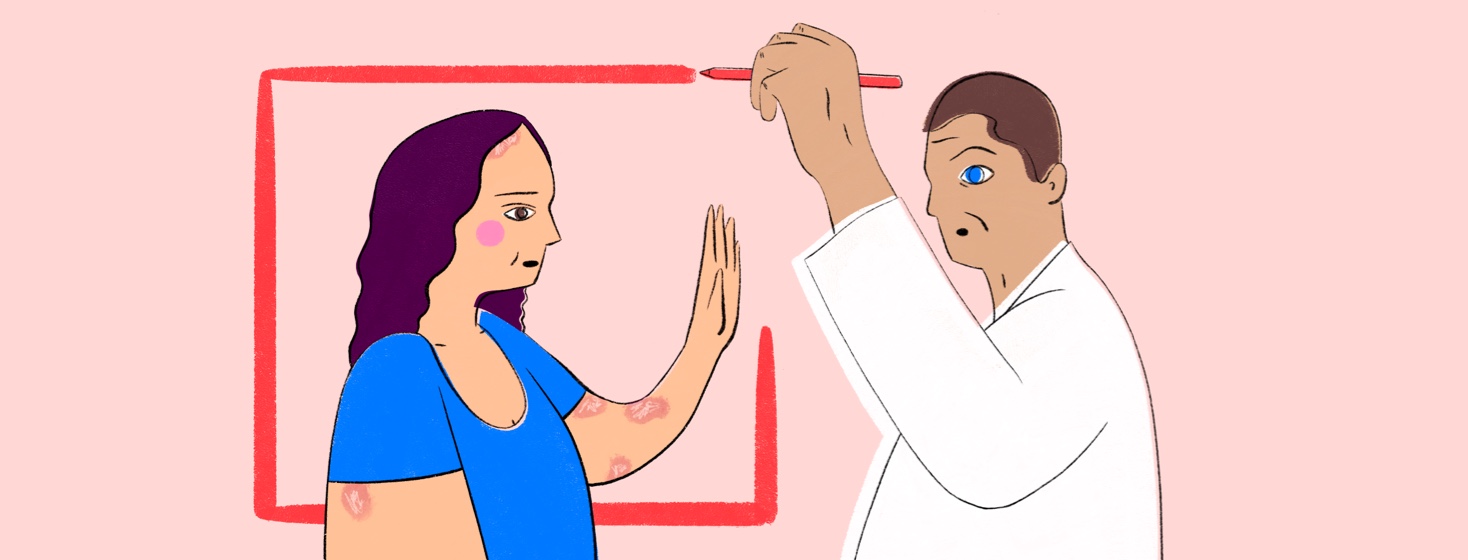Medical Gaslighting and Psoriasis
Medical gaslighting is a deeply concerning issue in healthcare. It affects countless people, particularly women and people of color. This can lead to a frustrating and distressing healthcare experience, especially for people dealing with chronic conditions like psoriasis.1-3
What is medical gaslighting?
Medical gaslighting is when a person’s symptoms are downplayed, dismissed, or not taken seriously by healthcare professionals. It is a form of mental manipulation. A person is made to doubt their own experiences or feel like they are exaggerating their symptoms.3,4
Here are some examples of medical gaslighting:3,4
- Your concerns, questions, or feelings are minimized or made to feel “less than.”
- Physical symptoms are chalked up to “just anxiety.”
- You keep being interrupted or talked over by a healthcare provider.
- Your doctor says something to the effect of, “You look fine; there’s nothing wrong with you.”
- You are made to doubt your own judgment or instincts.
Sadly, this is not a new phenomenon. Medical gaslighting has been going on for decades. And research shows it affects more women than it does men.1,3
The gender disparity
Medical gaslighting affects women at a much greater rate than men. Gender bias in healthcare can lead to symptoms dismissed as mental or emotional issues. This can have serious consequences, like delays in diagnosis and treatment.2,5
The role of implicit bias
Implicit bias plays a huge role in medical gaslighting. Implicit bias is the unconscious attitudes or stereotypes that people hold about others based on their race, gender, sexual orientation, socioeconomic status, or age.5
These biases can affect decision-making and behavior. It happens even when people are not consciously aware of them. When it comes to healthcare, implicit bias can have negative effects and contributes to medical gaslighting.2,5
A 2022 study found that women and people of color waited longer to be seen by a doctor in an emergency room compared to men and white people. This happened even when they had similar symptoms.2
People of color, the LGBTQ+ community, and those with lower socioeconomic status are more vulnerable to medical gaslighting. Implicit biases and discrimination within the healthcare system can make it even harder to have their concerns taken seriously.2,5
How does medical gaslighting affect people with psoriasis?
Medical gaslighting can affect people with psoriasis in emotional and physical ways.2,5
Emotional toll
Experiencing medical gaslighting can lead to feelings of frustration, self-doubt, anxiety, and depression. When your concerns are brushed aside or ignored, it is natural to question your own judgment and start to believe that your symptoms are “all in your head.” Especially when someone with authority – like a doctor – is doing the gaslighting.1-5
Stress can make physical symptoms of psoriasis worse. It can trigger a psoriasis flare and making itching worse. Stress may also make it even harder to advocate for yourself in the healthcare system.6
Physical toll
One of the most concerning aspects of medical gaslighting is its potential to delay the diagnosis of medical conditions. When left untreated, psoriasis symptoms can get worse. Psoriasis also leads to other complications like psoriatic arthritis, inflammation in other areas of the body, and certain eye conditions.2,7
Early diagnosis and treatment are needed to get the condition under control. If you are being gaslighted, crucial treatment could be delayed.7
Tips for advocating for your health
Gaslighting can be hard to point out in the moment because it can be hard to know when it is happening. These tips can help you be your own best health advocate and avoid being “gaslit:”3,4
- Educate yourself – Learn about your condition and its symptoms so you can articulate your concerns effectively.
- Keep a health journal – Document your symptoms, their severity, and any patterns you notice. This can be a valuable resource when talking to healthcare providers.
- Get a second opinion – If your concerns are not being addressed, do not hesitate to seek a second opinion from another healthcare professional.
- Trust your instincts – You know your body better than anyone else. If something does not feel right, speak up.
- Bring support – Having a trusted friend or family member with you during appointments can provide emotional support and help ensure your concerns are heard.
- Request specific tests – If you suspect a particular condition, ask your healthcare provider for specific tests or referrals to specialists.
What to do if you have experienced medical gaslighting
Everyone deserves to be heard and receive answers to questions or concerns about their health and body. If you have experienced medical gaslighting, here are some steps you can take:3,4
- Talk to your provider – Express your concerns with your healthcare provider. They may not be aware of how their actions or words have affected you.
- Seek support – Consider joining communities for people with your condition or those who have experienced medical gaslighting. Sharing experiences can be validating and therapeutic.
- File a complaint – If you believe your treatment was inappropriate or discriminatory, consider filing a complaint with the healthcare facility or your local regulatory authority.
Empower yourself
Medical gaslighting can have serious consequences for people with chronic conditions like psoriasis. By understanding how it can affect you and your health, you can empower yourself to receive the care you deserve.

Join the conversation